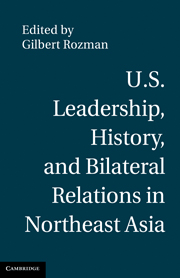Book contents
- Frontmatter
- Contents
- List of Contributors
- Acknowledgments
- U.S. Leadership, History, and Bilateral Relations in Northeast Asia
- Introduction
- PART I HISTORICAL MEMORIES AND BILATERAL TIES WITH ALLIES
- 1 Japan's Historical Memory toward the United States
- 2 Values and History in U.S.–South Korean Relations
- 3 U.S. Leadership, History, and Relations with Allies
- PART II HISTORICAL MEMORIES, JAPANESE–SOUTH KOREAN RELATIONS, AND U.S. VALUES
- PART III HISTORICAL MEMORIES, SINO–SOUTH KOREAN RELATIONS, AND U.S. VALUES
- Index
3 - U.S. Leadership, History, and Relations with Allies
from PART I - HISTORICAL MEMORIES AND BILATERAL TIES WITH ALLIES
Published online by Cambridge University Press: 01 March 2011
- Frontmatter
- Contents
- List of Contributors
- Acknowledgments
- U.S. Leadership, History, and Bilateral Relations in Northeast Asia
- Introduction
- PART I HISTORICAL MEMORIES AND BILATERAL TIES WITH ALLIES
- 1 Japan's Historical Memory toward the United States
- 2 Values and History in U.S.–South Korean Relations
- 3 U.S. Leadership, History, and Relations with Allies
- PART II HISTORICAL MEMORIES, JAPANESE–SOUTH KOREAN RELATIONS, AND U.S. VALUES
- PART III HISTORICAL MEMORIES, SINO–SOUTH KOREAN RELATIONS, AND U.S. VALUES
- Index
Summary
U.S. leadership of alliances with Japan and South Korea long avoided history and, by its very nature, stifled candid discussion of differences in historical memories. As part of the Yoshida Doctrine, Japan's leaders deferred to U.S. international leadership while postponing raising sensitive historical issues. Even more reliant on U.S. support, South Korean leaders used their dictatorial power to suppress discussion of the most sensitive historical issues linked to the United States. Given that conservatives in each state feared that progressives would seize any sign of anti-Americanism to attack the legitimacy of the government, censorship served domestic political objectives. Yet, it also allowed accusations and rumors to spread without being adequately answered. During the 1990s and 2000s, conservatives in these states have shown that they have historical grievances too, while progressives have found new opportunities to have their voices heard. Seeking answers to far-reaching national identity questions, both Japanese and South Koreans were prior to the military crisis of 2010 newly poised to raise history issues with the United States in a more insistent manner.
While Japan and South Korea are close allies clearly committed to democratic values, unlike most U.S. allies in other parts of the world they are troubled by memories centered on past American foreign policy that have been artificially and only temporarily suppressed over many decades. This little-recognized reality could become a stumbling block in attempts to sustain U.S. leadership in Asia, especially since these countries are tempted by notions of Asianism or reunification.
- Type
- Chapter
- Information
- Publisher: Cambridge University PressPrint publication year: 2010

